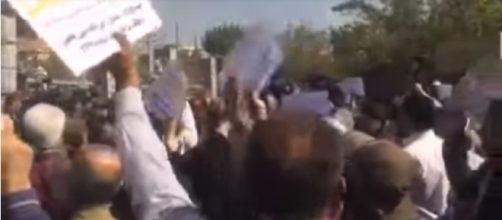The preamble of the Universal Declaration of Human Rights, the governing document on global human rights, states: “Whereas recognition of the inherent dignity and of the equal and inalienable rights of all members of the human family is the foundation of freedom, justice and peace in the world.” For the past 40 years, the Iranian Regime has waged a bloody war against these values. The ruling theocracy has been labeled the world’s most active state sponsor of terrorism. It has established a reputation as an intolerant, fundamentalist regime that has institutionalized extremism.
Horrific rights abuser
It is also one of the world’s worst abusers of human rights and executioners of children, according to Amnesty International. Yet the regime continues to act with impunity on these fronts and has never been tried for the crimes it has committed in its perverse efforts to retain power. In 1988, one of the world’s worst atrocities since World War Two took place in iran. On orders from former supreme leader Ruhollah Khomeini, 30,000 political prisoners were summarily executed while incarcerated. The victims were activists of the leading opposition the Mujahedin-e Khalq (MEK) and were killed for their pro-democracy beliefs.
The commissions of death
Amnesty International reported in 1990 that the first question that the prisoners were asked by the death commissions, set up to handle the executions, was: “What is your political affiliation?” If they answered that they supported the MEK, they were taken away and quickly executed.
In subsequent years, the regime was hell bent on covering up its crimes. Many of the masterminds behind this terror continue to serve as top officials in the regime, and the mass graves that have been found are off limits to the citizens of Iran.
Last year, a recording was leaked where Khomeini’s heir apparent at the time, Hossein Ali Montazeri, was heard condemning the murders in August 1988. Now is the time to bring the Iranian regime to task, and make those responsible answer for crimes that even the mullah regime's no. 2 could not stomach. Human rights experts, including the UN’s Special Rapporteur on the Situation of Human Rights in Iran, have written multiple reports on the criminal erosion of human rights in Iran.
The UN's current stance is to propose the ruling regime launch its own investigation into the crimes committed by its own officials. The very suggestion belittles the suffering experienced by the victims and their families, many of whom have been persecuted for speaking out and demanding that their loved ones’ graves be identified. And it makes a mockery of the vision established in 1945.
International criminal negligence
To ignore or reject these facts is not only shameful, but criminally negligent, and makes every nation that does so complicit with the Iranian regime’s atrocities and an accessory after the fact to the murders. Human rights are not a political issue, and they are not a strategic consideration.
Human rights are universal and inalienable. The nations that believe they can curry political favor with killers are dangerously naive and blind.
In the 1940s, the world saw the result of appeasing a brutal regime in Germany. Now, we ask why those nations did not take action in 1988, and have not taken action since with regards to the evil, religious fascism ruling Iran. Have they not seen the terrible aftermath of their lack of political courage? Every nation that claims to trumpet the importance of human rights loses its credibility when it refuses to speak to the crimes committed in Iran. The issue with the Iranian regime is not simply its nuclear program.
Search for justice
Without human rights, our civilization cannot sustain itself.
Our liberties and rights form the bedrock of mutual respect upon which human society sits. To view human rights abuse as a vice, to be indulged in when convenient, is inhuman. We must be absolute in our quest for the truth, and uncompromising in our belief that the Iranian people deserve justice and accountability from the regime that brutalizes them.
To this end, the stakeholders in this year’s Iran human rights censure at the United Nations must include a reference to the 1988 massacre in the resolution, and call for a commission of inquiry for the purpose of holding the perpetrators, who are current regime officials, to account. No consideration, economic, political or otherwise justifies inaction in this regard.


